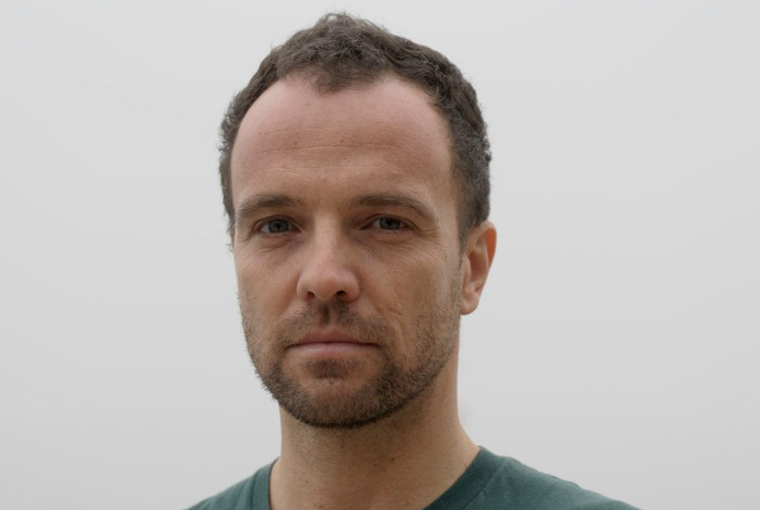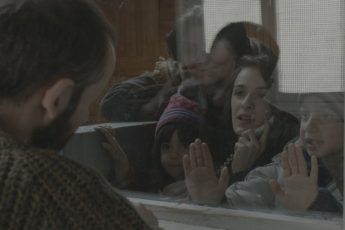
Colette de Castro met Athanasios Karanikolas, director of “At Home”, during the Berlin film festival to speak to him about his new film, which screened in the Forum section of the festival.
How did you come up with the story of your new film?
Basically, I was interested in the character. I was wondering about a hypothetical situation, which came up out of a quarrel with a friend of mine. I was thinking: what would happen if someone you employ gets really sick and you have to take responsibility for them? Then I wanted to find a character who would react to this kind of injustice in a very different way. I’ve seen scenes about revenge once too often, and for me it’s too over the top. I wanted to see someone who would propose a character with a lot of strength, but also a lot of fragility in her character.
When Nadja, the main character of your film is fired, she doesn’t get angry. But is it actually unusual for someone who’s fired in that way to react in such a passive way?
But she’s not passive, a lot of people will think she’s passive and a victim, but she’s not. For me it takes a lot of strength and a lot of courage to forgive and to accept, to go on loving people who’ve done you wrong, because you can’t break the emotional bonding. That’s my interpretation. For me, she’s a true hero because she finds a way to let go and to accept what happened to her. There are examples of people like that, and I really look up to them. I think in real life we fight and get revenge and do all that stuff. In a film I was looking for someone who brings a new perspective to the situation, who would react with love. It sounds very Christian, although most of the Christians I know don’t manage to do that in real life.
I think a lot of people might agree that the character is very strong, but they could question why she doesn’t reach out more to her family: her mother, or daughter.
Well, she’s a very dignified person. She does call them, she does try to contact them but there is a big distance, because they have their own lives. She’s kind of self-contained. It’s not a weakness; I think it’s a decision to deal with it in this way. A lot of people will see this as a story of injustice, these people who treat their housemaid badly but that’s not the point. It was to create this character who deals in a specific way.
I was struck by one scene when the father insists on giving money to Najda’s boyfriend. Could you tell me about Stephanos’ relationship to money?
There are people who deal with money in their everyday life. As they say, those who know the price of everything and the value of nothing. In this case, he believes that everything can be bought; he gives her a thick envelope and says this is for you, good-bye. It’s a thought process that takes place in people’s mind who deal with all … It’s a bargain, an exchange. It’s very clear. The other man refuses of course, because of his pride. For him there is another kind of value to human relationships so the other guy to state his power he just hides it, this is his way of stating power.
Do you see this as a particularly masculine way of dealing with money?
It could be, I had a father who was like that, he was a wonderful person but his main goal in life was to make money, he believed that the world was out there to be bought. I personally don’t have that experience but I’m sure there are women like that. I’m sure it’s not gender-specific.
I was wondering about the scene during dinner when they invite Nadia, the maid, to have a glass of wine with them. You film this difficult situation, when the boundaries are unclear, very well. How did you study that relationship, did you have a particular case in mind?
Yes I had many cases in mind. I’ve been at many tables like that with friends; and in my own family we had a maid from Georgia for some years. That’s the way we dealt with her. We had dinner with her often. The boundaries get blurred immediately when you wake up with someone, spend all day with someone. That was also an important point of the film, to show that this distinction is no longer this thing we know from English films, where the servants would have their apartments. But the boundaries are still there and they become walls when responsibility is required. So for example in the film when she gets sick suddenly they say, “ok you’re not family any more”. The whole thing is like a masquerade, we can pretend we’re all the same but… that’s what I’ve seen around me in modern society.
What about the comment they make during this dinner-table scene, about Nadja speaking perfect Greek? Could this be interpreted as a racist comment?
Of course it’s racist, but in his mind it’s a compliment. He’s saying you can do this job. It’s an asset. You choose people because of what you can do for us. He’s saying: I don’t want my child to wake up to somebody with a strong Greek accent, a lot of people have East European nannies and the child grows up with an accent. It’s a comment I’ve heard around in Greece a lot.
Thank you for the interview.




Leave a Comment